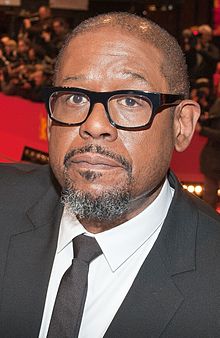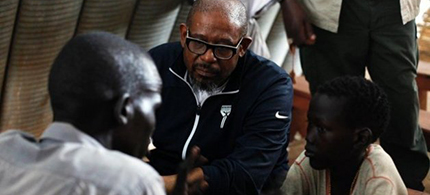Securing a Future for Child Soldiers
MILITARISM, 22 Feb 2016
Forest Whitaker - Reader Supported News
14 Feb 2016 – The word “childhood” usually brings to mind things like school, friends or play. But for too many children, these are foreign concepts. In dozens of armed conflicts around the world, there are currently tens of thousands of children — and some estimates even go as high as 250,000 — engaged as soldiers or being held by armed groups. The notion of children living in military camps or fighting wars is inhuman in the strictest sense of the word: it robs its victims of a phase of their lives to which every human being is entitled. But for many children impacted by conflict, this is the reality they must face every day.
The situation is especially dire in South Sudan, a nation where violence continues even after last August’s peace agreement between government and opposition leaders. This conflict has disproportionately affected the children of South Sudan. During my many visits to the country, I have seen malnourished boys and girls in camps for displaced people, schools turned into army barracks, and perhaps worst of all, hundreds of child soldiers wearing military uniforms and carrying guns. According to UNICEF, there have been 16,000 children recruited by armed groups in South Sudan since the conflict began.
In 2014, I and Leila Zerrougui, the UN Special Representative for Children and Armed Conflict, met with ranking leaders from both sides of the conflict to discuss this pressing issue. Despite pledges from South Sudan’s president and the primary rebel leader that they would end the recruitment of child soldiers and do more to protect children impacted by the violence, little genuine progress has been made. According to the UN, more than 2,500 children were recruited as soldiers in 2015, and over the past few months, the use of child soldiers has been the most frequently reported violation of the August peace agreement.
“The notion of children living in military camps or fighting wars is inhuman in the strictest sense of the word: it robs its victims of a phase of their lives to which every human being is entitled.”
In South Sudan and six other countries, the Children, Not Soldiers campaign — an initiative undertaken by the UN Special Representative for Children and Armed Conflict — continues to work with governments and other groups to end the use and recruitment of child soldiers. My commitment to Children, Not Soldiers is rooted in my own experiences growing up in South Los Angeles, knowing too many children whose lives would be forever marred by gang violence. For those children whom violence is robbing of a future, it is imperative that we act now.
But we must also realize that our obligations to these children do not end when they are liberated from armed forces and groups. Helping children rebuild their lives after such unfathomable traumas is central to the Children, Not Soldiers campaign — reintegration is part of each and every action plan signed by governments with the United Nations.
We may take a child out of an army, but unless we do more for him — help him re-enter society, enroll him in a good school, teach him a useful trade — we have not set him free. For so many of these children, war and violence are all they have ever known, and if we do not take it upon ourselves to teach them something new, then they are just soldiers-in-waiting. And when another war breaks out five or ten years in the future, they will be the first ones recruited to go back to the battlefield.
We must act to prevent this. Not only because these children deserve the chance to live normal, healthy lives, but also because we have an opportunity to avert future violence. If we can make these children emotionally whole again and restore a sense of normalcy to their lives, then they will be able to put down their arms for good, and, instead of perpetuating vicious cycles of violence, they will help build a peaceful future for their country.
In the last few years, we have coalesced around this issue in unprecedented ways and have made important strides toward ending the use of child soldiers around the world. Countries that have long been among the most egregious violators are now showing a true will to reform. The international community must continue its support for these efforts without compromise or exception, and — just as importantly — we must provide the resources necessary to put in place and strengthen the programs that we need to truly rebuild these children’s lives.
It is impossible for us to comprehend the magnitude of a child soldier’s pain: how deep his wounds, how heavy her burden, how alone these children must feel when they return from the battlefield to a world they do not recognize. Unless we are there to meet them with open arms, open homes, and open schools, their wars will never end. And neither will ours.
___________________________________
Forest Steven Whitaker is an American actor, director, and producer. Whitaker was inducted as a UNESCO Goodwill Ambassador for Peace and Reconciliation in a ceremony at UNESCO headquarters on June 21, 2011. As Goodwill Ambassador, he works with UNESCO to support and develop initiatives that empower youths and keep them from entering or remaining in cycles of violence. In May 2011, Whitaker co-founded the International Institute for Peace (IIP) at Rutgers University in Newark, New Jersey. IIP operates under the auspices of UNESCO as a Category 2 Center.
Go to Original – readersupportednews.org
DISCLAIMER: The statements, views and opinions expressed in pieces republished here are solely those of the authors and do not necessarily represent those of TMS. In accordance with title 17 U.S.C. section 107, this material is distributed without profit to those who have expressed a prior interest in receiving the included information for research and educational purposes. TMS has no affiliation whatsoever with the originator of this article nor is TMS endorsed or sponsored by the originator. “GO TO ORIGINAL” links are provided as a convenience to our readers and allow for verification of authenticity. However, as originating pages are often updated by their originating host sites, the versions posted may not match the versions our readers view when clicking the “GO TO ORIGINAL” links. This site contains copyrighted material the use of which has not always been specifically authorized by the copyright owner. We are making such material available in our efforts to advance understanding of environmental, political, human rights, economic, democracy, scientific, and social justice issues, etc. We believe this constitutes a ‘fair use’ of any such copyrighted material as provided for in section 107 of the US Copyright Law. In accordance with Title 17 U.S.C. Section 107, the material on this site is distributed without profit to those who have expressed a prior interest in receiving the included information for research and educational purposes. For more information go to: http://www.law.cornell.edu/uscode/17/107.shtml. If you wish to use copyrighted material from this site for purposes of your own that go beyond ‘fair use’, you must obtain permission from the copyright owner.

